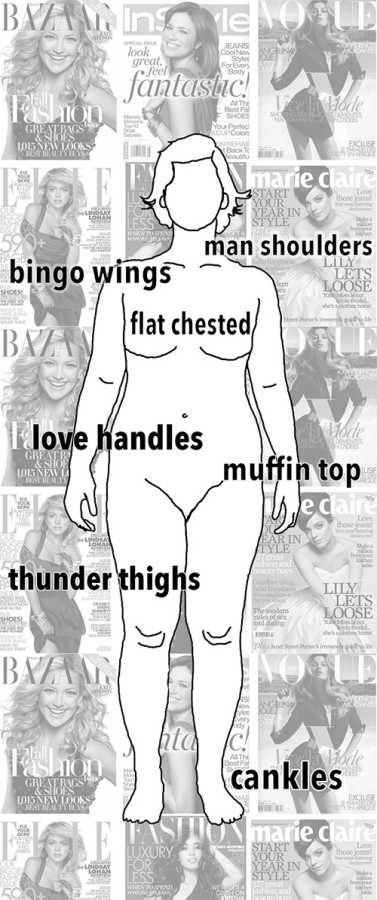Body image requires self-reflection, conscious recognition
December 18, 2015
I’ve been told I’m a generally positive person. Yet recently my friend told me that I’m positive about virtually everything except myself. I decided to put her to the test by counting how many times I said degrading things about myself. Over one week, I said and thought around 80.
Before writing this article, I never truly realized how I viewed myself. Now, I can begin to grasp how accepting your body image is as much a personal thing as it is a societal problem. It’s a personal decision to concede to negative comments about yourself or refute compliments.
I never trust the compliments my mother or family gives; I always assumed that everybody in my family thought I was beautiful since we share the same bloodline. However, I’ve realized that’s because my perception of my own beauty has to start with myself and end with constant support from everyone around me.
When I was exposed to others who mindlessly fat-shamed themselves during lunch by saying, ‘Oh, I’m so fat’ after eating, I thought that meant I was ugly. I immediately questioned myself by thinking, Well, if they feel that way about themselves, what do they think of me? I wouldn’t eat some of my food or eat somewhere else so they wouldn’t see me eating.
I still get a little self-conscious whenever I hear someone talk about how they’re eating so much or how fat they are. Looking back on those experiences, though, I can see that they were not secretly thinking about me or my weight. They were not looking at me hatefully like how I looked at myself. They were simply doing what I would do every morning in the mirror: put themselves down.
Even after exercising, dieting and reading other blogs about how to gain self confidence, I still undermine myself like the people at the lunch tables. I do not look in the mirror before heading out to early bird and think, “I look good,” but I no longer look at myself and fail to see beyond my flaws.
I have learned I cannot blame societal beauty standards for what I see in the mirror. When I looked at myself with disgust in my wide waist and not so toned body, I brushed-off everything else good about myself.
We often look into the mirror and expect our bodies to look like supermodels and everyone we see on TV, but beauty is fading. When I’m 80, I’ll have a lot more worries than my waistline and the number on a scale. So, why did I, for so long, spend an unreasonable amount of time forming my life around those two things? Focusing on something temporary makes us forget all our other dazzling qualities.
If you don’t look in the mirror anymore because you feel ashamed or ugly, I just want to let you know that a mirror doesn’t show talent, personality or even beauty.
According to social worker David Hartman, adolescence is typically a period full of self examination based on what we see around us. So, the thoughts are generated in our mind, but the standards are created by the social construct and media around us.
“More often than not we have moments where we struggle with [body image],” Hartman said. “I think that all kids are thinking about their bodies in relation to their peers, and, […] most kids probably go through times in their lives where they probably wish they were x, y or z.”
It’s important to recognize we are not the only ones struggling with ourselves; being mindful of our comments can go a long way. If we all thought about the impact of our words and took two minutes everyday to make someone feel better, the world would be a much more positive place; we could support those who have a difficult time getting through the hyper critical part of adolescence.
If you find yourself in a rut because you think everyone around you believes you aren’t pretty enough or feel like you’re not pretty enough, this is me telling you that you are so gorgeous, and more people than you know feel the same way.



